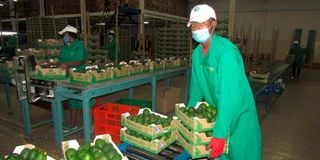Premium
Kakuzi suspension from European market cuts profit by half

Workers at Kakuzi's avocado factory. The agriculture firm’s profits plunged by nearly 50 per cent in 2021.
Agriculture firm Kakuzi’s profits plunged by nearly 50 per cent last year, as the company’s sales in the European market fell drastically in the wake of the suspension of its products by major buyers over claims of human rights violations.
In the financial statements released Tuesday, Kakuzi reported that its profits for 2021 reduced by 48.6 per cent to Sh319.7 million, from Sh622 million in 2020.
The company last year sold products worth Sh3.29 billion globally, down from Sh3.6 billion in 2020. This marked an 8.6 per cent reduction in total sales, even as sales to external customers alone suffered a bigger fall of 9 per cent.
Avocados, the company’s best-selling product, saw sales to UK and Europe plunge by 27 per cent (Sh635 million), single-handedly contributing the largest portion to the poor performance, even as tea, forestry and macadamia sales – Kakuzi’s three other top selling products – increased by 6 per cent, 14 per cent and 35 per cent respectively.
Tea sales increased from Sh245.8 million in 2020 to Sh260.4 million last year, macadamia from Sh654.8 million to Sh886.4 million and forestry from Sh286.4 million to Sh327.4 million, over the same period.
Avocado profits
The plunge in avocado profits by 69.6 per cent came at a time leading supermarkets in the UK – Tesco, Sainsbury's and Lidl – suspended the firm’s Hass avocados from October 2020, when human rights allegations against Kakuzi’s security guards emerged. The agricultural firm was accused of violence and sexual assault on residents of Makuyu, Murang’a County, in a case that would later result in the firm compensating the victims.
Kakuzi has been on a reparations journey to rescue its reputation since then, forming a human rights advisory committee, in which it has appointed prominent personalities including former Attorney-General Githu Muigai.
The company, however, attributes the fall in avocado sales to poor production last year and blames logistical challenges that affected supply chains during the Covid-19 pandemic.
“Logistics both nationally and internationally came under some strain. Still, due to the dedicated service of the government agencies involved in exporting fresh produce, the impact on our operations was not significant,” Kakuzi stated in its annual report.
Major improvement
Profits from products that were not suspended by its major buyers also witnessed a major improvement, with tea, which had made a loss of Sh19 million in 2020 earning the company Sh14.8 million in profits last year, while forestry, whose profits in 2020 were Sh79.8 million almost doubling to Sh144.3 million.
Macadamia’s profits, however, reduced from Sh306 million to Sh281.5 million as selling and distribution costs increased by over 60 per cent compared to 2020.
“Good rainfall throughout the year allowed our 19 dams to fill, providing us with adequate water resources. Our micro-jet irrigation systems now cover over 1,363ha of avocado and macadamia orchards,” said Kakuzi Chairman Nicholas Ng’ang’a.





